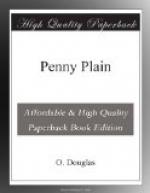The sun had still something of its summer heat, and it was pleasant to stand there and listen to the sound of the river over the pebbles and see the flaming trees reflected in the blue water all the way up Tweedside till the river took a wide curve before the green slope on which the castle stood. A wonderfully pretty place, Priorsford, he told himself: a home-like place—if one had anyone to come home to.
He turned slowly away. He would go and look at The Rigs. His mother had come to it as a bride. He had been born there. Though occupied by strangers, it was the nearest he had to a home. The house in Prince’s Gate was well furnished, comfortable, smoothly run by efficient servants, but only a house when all was said. He felt he would like to creep into The Rigs, into the sitting-room where his mother had always sat (the other larger rooms, the “good room” as it was called, was kept for visitors and high days), and lay his tired body on the horsehair arm-chair by the fireside. He could rest there, he thought. It was impossible, of course. There would be no horsehair arm-chair, for everything had been sold—and there was no mother.
But, anyway, he would go and look at it. There used to be primroses—but this was autumn. Primroses come in the spring.
Thirty years—but The Rigs was not changed, at least not outwardly. Old Mrs. Reid had loved the garden, and Great-aunt Alison, and Jean after her, had carried on her work.
The little house looked just as Peter Reid remembered it.
He would go in and ask to see it, he told himself.
He would tell these Jardines that the house was his and he meant to live in it himself. They wouldn’t like it, but he couldn’t help that. Perhaps he would be able to persuade them to go almost at once. He would make it worth their while.
He was just going to lift the latch of the gate when the front door opened and shut, and Jean Jardine came down the flagged path. She stopped at the gate and looked at Peter Reid.
“Were you by any chance coming in?” she asked.
“Yes,” said Mr. Reid; “I was going to ask if I might see over the house.”
“Surely,” said Jean. “But—you’re not going to buy it, are you?”
The face she turned to him was pink and distressed.
“Did you think of buying it yourself?” Peter Reid asked.
“Me? You wouldn’t ask that if you knew how little money I have. But come in. I shall try to think of all its faults to tell you—but in my eyes it hasn’t got any.”
They went slowly up the flagged path and into the square, low-roofed hall. This was not as his mother had it. Then the floor had been covered with linoleum on which had stood two hard chairs and an umbrella-stand. Now there was an oak chest and a gate-table, old brass very well rubbed up, a grandfather clock with a “clear” face, and a polished floor with a Chinese rug on it.




